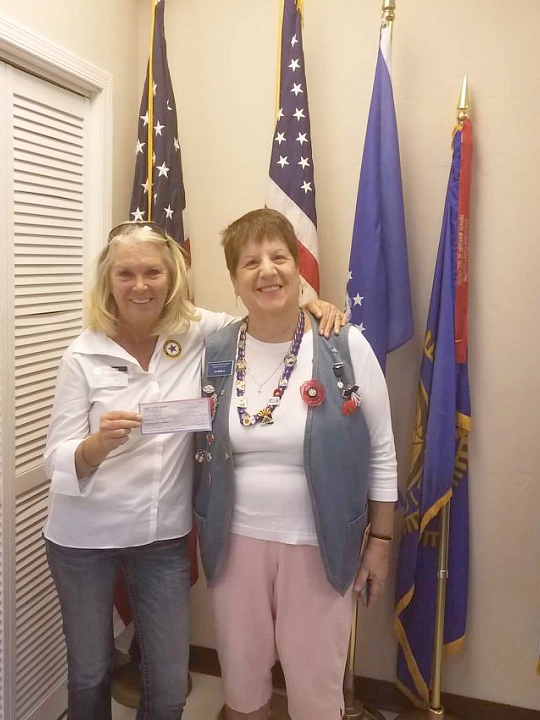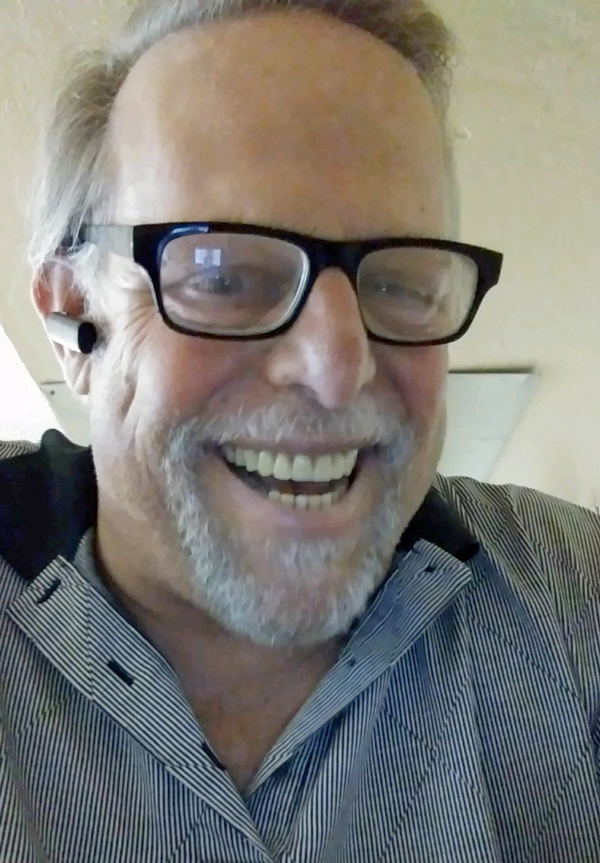Guest blog by Susan Schoenbeck, Unit 66 Auxiliary member, Arizona
Volunteering can make a difference in your life. By allowing you to meet new people, develop friendships, take on a challenge, and have fun, volunteering provides not just social benefits, but also individual benefits.
According to the Corporation for National and Community Service, “Perhaps the first and biggest benefit people get from volunteering is the satisfaction of incorporating service into their lives and making a difference in their community and country.”

Unit 131 President Jan Melhorn (on the right) and Unit 66 President Jan Christiansen, with a $1,500 check from bake sale proceeds.
This does not mean you need to give money to others. Your time, your attention, offering support or solace, and sharing your wisdom are all ways in which you can give and also recoup rewards for yourself. Handing out hugs even counts. The Dalai Lama has said, “There is deep joy and love in a hug.” Hugging releases chemicals in our bodies that relax our muscles and lowers blood pressure of older adults with hypertension.
Some of the individual health benefits gained by volunteering:
Like others, you can help in your own backyard. One example is in Arizona. There are two American Legion Auxiliary units outside the Tucson metropolitan area. One is in Green Valley and the other in Sahuarita, Ariz. (Unit/Post 66 and Unit/Post 131). Post members work hand-in-hand to serve The American Legion Family. Their first joint project revolved around providing dental care for local veterans.
Veterans are provided one dental appointment post service, unless 100 percent disabled. This system leaves some veterans without needed care. Mark Jablonka, a veteran of the Vietnam Era (Airforce Security Forces 1973 to 1990), accessed the Smiles for Veterans program co-sponsored by Unit/Post 66 and Unit/Post 131. Low self-esteem and depression accompanied his poor dental status. He hesitated to smile in job interviews.
The Smiles for Veterans program provided free dental treatment for Jablonka. Now, he can smile at people he would not have before. He said, “This program helped me regain my dignity.” Now, he and his employer reap the benefits a smile brings. Jablonka works at Rally Point, a Tucson-based organization wherein veterans help veterans through trying times. Studies show that people who smile more often are likely to live approximately seven years longer than those who do not smile.

Mark Jablonka
From helping prepare and serve meals for veterans, to contributing time and baked goods for sales wherein profits go to support programs for veterans, Auxiliary members not only give, but also receive as they contribute while making new friends. Both Auxiliaries support the national American Legion Auxiliary causes together. Friendships are associated with happiness and better health.
Recently, Unit/Post 66 and Unit/Post 131 completed a project to provide clothing for women warriors. The two Auxiliaries look forward to partnering on more clothing drives for women in the years ahead.
In the spirit of Service, Not Self, the mission of the American Legion Auxiliary is to support The American Legion and to honor the sacrifice of those who serve by enhancing the lives of our veterans, military, and their families, both at home and abroad. For God and Country, we advocate for veterans, educate our citizens, mentor youth, and promote patriotism, good citizenship, peace and security.